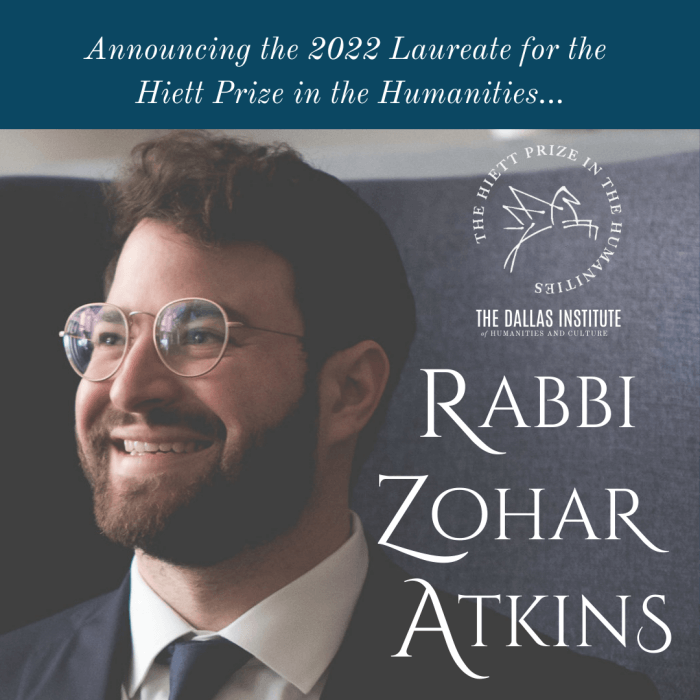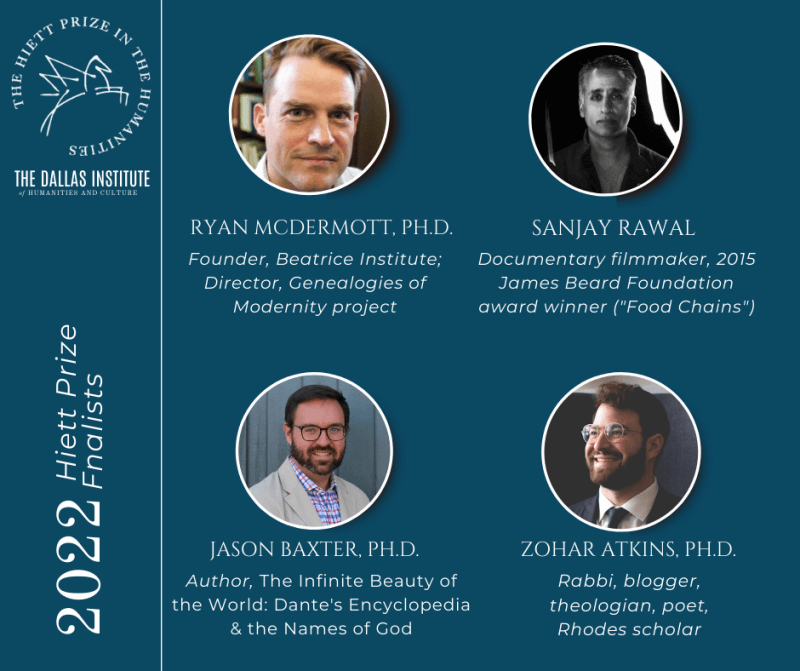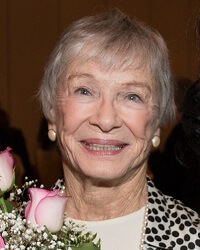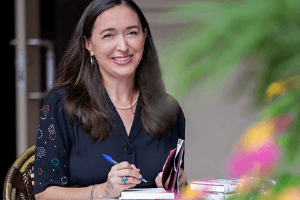


The Dallas Institute’s Hiett Prize honors an emerging leader in the humanities whose vision promises to change the way we see our world. Established in 2005 with a generous gift from benefactor Kim Hiett Jordan, the Hiett Prize celebrates new imagination in disciplines that deepen our understanding of what makes us human: philosophy, poetry, history, theology, literary criticism, among others.
Join us for our Panel Discussion on April 11, as well as for our announcement of the 2022 Hiett laureate on April 12, 2022!

Zohar Atkins – Jason Baxter – Ryan McDermott – Sanjay Rawal
Vibe Shift: What Counts as Wisdom Today?
Φύσις κρύπτεσθαι φιλεῖ – phusis kryptesthai philei – “Nature loves to hide”
– Heraclitus (535-475 BCE)
Wisdom, like nature, loves to hide. Join us at 6pm in the Nancy Cain Marcus Conference Center for a conversation with three of the four exciting finalists for the Dallas Institute’s Hiett Prize in the Humanities.
Thanks to the generosity of Kim Hiett Jordan, the Dallas Institute’s Hiett Prize allows us to celebrate new thinking and recall old truths voiced in new and surprising ways. Particularly now, as we collectively emerge from long isolation and consider new challenges in a fraught and anxiety-provoking cultural moment, we are eager to find where wisdom hides!
Our panelists come from different backgrounds – one is a rabbi-poet who writes about Heidegger; one is a literary critic who considers the Middle Ages; another is the director of a project called “Genealogies of Modernity.” We anticipate a rich and provocative discussion.
Location: Nancy Cain Marcus Conference Center – 2711 Routh St.
Date: Monday, April 11th, 2022
Time: 6:00-8:00 pm
Cost: Free to attend, and open to the public
Register: RSVP by clicking here
Hiett Prize Award & Celebration
Location: The Dallas Institute’s Stroud House, 2723 Routh Street, Dallas
Date: Tuesday, April 12th, 2022
Times:
Cost: Gratis. Reservations are required; places are limited.
Register: https://forms.gle/mxt3tN4rvmpBLZ377






The Dallas Institute of Humanities and Culture is pleased to announce Professor Zena Hitz as recipient of its 16th annual Hiett Prize in the Humanities. Prof. Hitz is a Tutor at St. John’s College, where she teaches across the liberal arts. Her B.A. degree in philosophy is from St. John’s, and she earned a Master of Philosophy degree from Cambridge University and a Ph.D. degree from Princeton University.
The annual Hiett Prize recognizes dedication to and achievement in the humanities by candidates who are in the early stages of their careers and whose work shows extraordinary promise. It is the opposite of a lifetime achievement award and seeks to encourage future leaders in the humanities by applauding their early accomplishment and supporting their work through a cash award of $50,000.
Institute Executive Director Emeritus Dr. Larry Allums remarked that this recipient takes her place among past winners as “eminently worthy of the Prize. Zena Hitz exemplifies the kind of work, all too rare these days, that the humanities can foster. We need thinkers and doers of Zena’s talent and vision to regain the solid ground on which the humanities have in the past steadied our culture.”
The Hiett Prize was endowed by Kim Hiett Jordan, a Lifetime Board Member of the Dallas Institute, to honor her parents, who inspired in her a lifelong love of learning.
In an age when widespread emphasis is placed on formal education as the route to a profitable career, Prof. Hitz is engaged in defending the intellectual life—learning for its own sake, for its “splendid uselessness,” as she provocatively puts it, rather than in the service of economic or political goals.
Her book Lost in Thought, published by Princeton University Press, explores the meaning and value of such learning and has received enthusiastic responses from academic and non-academic readers alike. It is written for general readers and stands alongside her more scholarly work on Plato, Aristotle, and other seminal thinkers.
For the first time in its sixteen-year history, the 2020 Hiett Prize was presented during an on-line gala on Wednesday, November 11, that featured, in addition to Prof. Hitz, several past Hiett winners, including the 2019 recipient Dr. Jessica Hooten Wilson, who presented the award to this year’s winner.

DR. JESSICA HOOTEN WILSON is Louise Cowan Scholar in Residence at the University of Dallas, an Institute Fellow, and the recipient of the 2019 Hiett Prize in the Humanities.
DR. WILSON’S WORKS
Giving the Devil His Due: Demonic Authority in the Fiction of Flannery O’Connor and Fyodor Dostoevsky
 Flannery O’Connor and Fyodor Dostoevsky shared a deep faith in Christ, which compelled them to tell stories that force readers to choose between eternal life and demonic possession. Their either-or extremism has not become more popular in the last fifty to a hundred years since these stories were first published, but it has become more relevant to a twenty-first-century culture in which the lukewarm middle ground seems the most comfortable place to dwell. Giving the Devil His Due walks through all of O’Connor’s stories and looks closely at Dostoevsky’s magnum opus The Brothers Karamazov to show that when the devil rules, all hell breaks loose. Instead of this kingdom of violence, O’Connor and Dostoevsky propose a kingdom of love, one that is only possible when the Lord again is king.
Flannery O’Connor and Fyodor Dostoevsky shared a deep faith in Christ, which compelled them to tell stories that force readers to choose between eternal life and demonic possession. Their either-or extremism has not become more popular in the last fifty to a hundred years since these stories were first published, but it has become more relevant to a twenty-first-century culture in which the lukewarm middle ground seems the most comfortable place to dwell. Giving the Devil His Due walks through all of O’Connor’s stories and looks closely at Dostoevsky’s magnum opus The Brothers Karamazov to show that when the devil rules, all hell breaks loose. Instead of this kingdom of violence, O’Connor and Dostoevsky propose a kingdom of love, one that is only possible when the Lord again is king.
Reading Walker Percy’s Novels
Reading Walker Percy’s Novels is a handbook for those who appreciate Percy’s fiction without understanding its philosophy. The book is written in a conversational style and is meant to be accessible to a broad audience.
“Wilson explains with great clarity the larger imaginative patterns of Percy’s works as well as the related complexities that characterized his diagnosis of modern society.” –Patrick Samway, SJ, author of Walker Percy: A Life
“The small size of Wilson’s primer on Walker Percy’s novels belies its largeness of vision. There are no neat plot summaries to excuse readers from wrestling hard with Percy’s five novels. On the contrary, she strikes right to their heart through succinct and sprightly analyses.” –Ralph Wood, author of Tolkien among the Moderns
Walker Percy, Fyodor Dostoevsky, and the Search for Influence
Walker Percy, Fyodor Dostoevsky, and the Search for Influence proposes a Christian idea of influence. It suggests that originality is not the key to good art, but rather imitation is. Walker Percy becomes a case study for how his Christian imitation of Dostoevsky made him not only a great artist but a literary saint.
AN INTERVIEW WITH DR. WILSON
Why do you think the humanities are important today?
Because we are human. In order for all of us to continue to be human beings, the way we were intended to be, we need the humanities. We need to study what makes us fully human. I think especially now when culture is trying to convince us that we’re either robots or animals, right? Society seems to have lost the definition of what a human being is but robots and animals don’t write poetry. They don’t write plays and perform them.
So all of those special niches that we have, that make up our culture, that is often called the study of the humanities. They really set us apart from the other world views or from the other ideas that tell us that we’re less than what we are or try to put us into a posthuman category that takes away the best part of what we are.
You are currently working on the completion of Flannery O’Connor’s unpublished Why Do the Heathen Rage? How did this journey begin?
You know, if you believe in the power of providence as I do then you will see it as providential. If not, then you can say it’s happenstance, but that’s just the less satisfying narrative of what happened.
As a grad student, I studied in Rome. While I was there they had an international Flannery O’Connor conference. At that time, I was finishing my dissertation and I used my school loan money to present one chapter of my dissertation at the conference. After, the keynote speakers were looking for a place to eat. They did not know where to go or how to order. From living in Rome and Florence, I had learned Italian and also knew great places to eat. So, I offered to take them to a great restaurant.
Here I was, this lowly grad student with the whole group of keynotes on O’Connor at this conference in Rome, and one of them was Billy Sessions–O’Connor’s authorized biographer and friend.
We connected and he told me that in the archive there was a manuscript that was never finished called Why the Heathen Rage? and it was O’Connor’s most Dostoyevskian work. I went and checked it out and I gave a presentation on it in Chicago two years later in 2011. There in the audience was Billy as well as Flannery’s cousin. They loved my reading of her novel. They thought it was insightful. They were impressed with what I had done and Billy said, “come to mass with me,” and after mass, he said, “if there’s anything you ever need, let me know.”
A couple of years later, I contacted Billy and told him that I thought that I could put Flannery’s novel together and that I believed people would want to read this work that she left behind. And from there, he recommended me to the estate. He said, “I’m not going to ever get around to this. I think you’re the person to do it.” The estate heard his recommendation. They said yes. And so here we are.
I know that some people will love it and others will hate it. I know people are going to ask, how I could you possibly produce her novel. But it has been awesome. It’s just been such a fun ride.
What do you think is the connection between contemporary authors and the classics?
Well, I think when you are well versed in something it becomes the lens through which one sees.
When I was at Pepperdine I was doing great books. I was learning by studying Sophocles in an ethical lesson and moving all the way up through the great tradition. The great books became the lens through which I read any other author. Those thoughts naturally become in conversation with the voices that are already inside your head, O’Connor then is bouncing off…conversations that were already at play within me.
As you digest the great works, they become part of you and then how can you read anything else? Except in conversation with those works.
In your teaching, you encourage your students to “imitate the beauty they find.” How do you do that?
When I teach creative writing classes the biggest goal is to cure my students of the misunderstanding that creative writing is about self-expression.
Instead, it is the world that is out there that is beautiful and you’re drawing from the world and the vocabulary that you’ve read elsewhere. It’s just impossible to discover writing all by yourself. And because it is actually impossible to do that then you need to be in control of your influences and control of what sources you’re drawing from and practice habit of filling your mind in your heart with the beautiful things that have been done before.
When I teach poetry, the students visit art galleries. They respond to art in front of them. We do a lot of walking by the creek on campus and looking at things that are beautiful outside of ourselves.
We respond to other people’s work, using it as a scaffold and rewrite a piece of content by practicing forms of imitation. It develops a sense of humility in students. They start to look at the whole world as beautiful and the way they’re responding to it poetically rather than exploitive or consumeristically.
When you were younger did you want to be an author or teacher?
Yeah, I always wanted to be a writer. That was number one. Even now that’s still my number one ambition–to constantly to get to write. It’s still my favorite thing to do.
My first publication was at age 5. I won an elementary school contest at a library to get your book published and so when I was 5 I published my first little book. I’ve always been a poet and a storyteller, that’s the kind of thing that I have always done.
Regarding teaching, I stayed away from it for a while. When you’re a writer, people will tell you that you’re going to become a teacher. And from there you have people saying things like, that is beneath you, or teaching will take you away from your writing or, you’ll never succeed as a writer if you’re a teacher.
Those things are not true. Teaching makes you a better writer.
Why do you write and when do you have the time?
I love words and the way that they go together and the way that they can transform one’s ideas, heart, and sometimes just one’s emotion.
I make writing my priority. It comes first, and then other stuff gets done later. So, I might lose time to work out that day because I didn’t get my writing done or you know I have to grade at midnight because I decided to make sure the first thing I did in the morning was to write for two hours.
What’s advice would you give to someone interested in working in the humanities?
I think that the humanities are a difficult route because it’s biased against the American ideal of success. The more that you study humanities the more you realize the purpose of it is to constantly be carrying on a torch and giving back to the next generation.
The more that you learn and the more you know then the more you’re giving away. It doesn’t really fit the American story, as you begin somewhere, and you climb. climb. and climb and progress until you get to the top of an industry or the top of the job. Humanities is just not like that. There really is no top mountain to climb. In reality, it’s constantly like you go up to the mountain, you get something, and then you bring it back down and then you go up again and then bring back down. It’s a life of continual hardship that you’re giving things away and it never stops, and you’ll be doing it until you die, you won’t ever reach retirement.
I think that it’s difficult for students because they want a career path. And so even when they start loving the humanities they try to have a career path that looks like the other disciplines where you have undergrad, grad school, you get a job, postdoc, maybe a grant, move up the ladder. They try to follow the theories of success but lose the love for the humanities in the process, because they aim at things that just don’t fit with what the humanities are telling them about themselves.
Is there anything else that you want us to know about you?
One of the things that I don’t want to lose in celebrating this prize is that although it’s one person receiving the award, there are many others who deserve a part of this award too.
I think of the number of teachers who influenced and supported me over the years. The students I get to teach are part of this process. The people who read the books and articles that I write and who are participating in the conversation with me. The friends of my local community as well as the people who will be in the room who just the fact that they’re investing their time to be there and be part of this conversation.
I know that my talents do not exist by themselves and they would be worthless if they did. It’s only because my talent has been fostered in the community and with valuable conversations that this prize can be beneficial.

Dr. Christopher Lebron is Associate Professor of Philosophy at Johns Hopkins University. He received his Ph.D. from Massachusetts Institute of Technology in the fields of Social Theory and Political Philosophy. His work currently focuses on political philosophy, social theory, the philosophy of race, and democratic ethics.
His first book, The Color of Our Shame: Race and Justice In Our Time, published in 2013 by Oxford University Press, won the American Political Science Association Foundations of Political Theory First Book Prize. His next book, The Making of Black Lives Matter: A Brief History of An Idea, will be published in October 2018, also by Oxford UP, and presents an intellectual history of the Black Lives Matter movement, tracing its origins and connecting it to the long tradition of the struggle for freedom and equal rights for African Americans that includes such figures as Frederick Douglass, Ida B. Wells, Langston Hughes, Zora Neal Hurston, James Baldwin, and Martin Luther King Jr. Professor Lebron writes articles and book reviews regularly for such publications as The New York Times, the Boston Review, and The Chronicle of Higher Education.
Dr. Lebron is the winner of the 2018 Hiett Prize in the Humanities.

2017 Hiett Prize in the Humanities Recipient, Dr. James Matthew Wilson has been on a spiritual and intellectual quest since his undergraduate days at the University of Michigan: to discover for himself—and to recover for Western culture—the sense of purpose and meaning largely disavowed and abandoned in our skeptical age. As he puts it, the fruits of his work thus far “are my effort to draw out the implications for our lives of the essential truth, goodness, and beauty of reality as a whole.”After earning an M.F.A. in Creative Writing and a Ph.D. in English Literature and Irish Studies from Notre Dame University, he began his tenure at Villanova University, where he is currently Associate Professor of Religion and Literature. A widely published, award-winning poet, scholar, and public intellectual, James has written numerous essays and articles and several books, including The Vision of the Soul: Truth, Goodness, and Beauty in the Western Tradition (2017) and Some Permanent Things, a collection of his published poems (2014).

2016 Hiett Prize Winner, Alia Malek was born in the U.S. of Syrian parents who planned to return to their homeland but instead began an unplanned life in diaspora as immigrants. Alia earned a Bachelor of Arts degree at Johns Hopkins and a Juris Doctorate at Georgetown University Law Center. For several years her legal work in civil rights took her to Washington, the West Bank, and Lebanon. In 2006, she received a Masters degree in Journalism from Columbia University and entered her writing career in earnest. After living and writing anonymously for two years in Damascus, Alia returned to the U.S. for the launch of Al Jazeera America. She is author of A Country Called Amreeka: U.S. History Re-told Through Arab American Lives and editor of Patriot Acts: Narratives of Post-9/11 Injustices. Her book The Home That Was Our Country: A Memoir of Syria was published in 2017.
Read the New York Times’s review of Alia’s book The Home That Was Our Country: A Memoir of Syria.

Dr. Scott Samuelson studied philosophy at Grinnell College (BA, 1995, valedictorian) and Emory University (PhD, 2001). Since 2000 he has taught at Kirkwood Community College in Iowa. In 2014 he was named Distinguished Humanities Educator by the Community College Humanities Association. Inspired by his students, he wrote his first book The Deepest Human Life: An Introduction to Philosophy for Everyone (University of Chicago Press, 2014), which has been well received not just by prominent reviewers but by numerous non-philosophers who found their philosophical voice with its help. The book is currently being translated into Chinese and Portuguese. Samuelson also writes movie reviews for Little Village and hosts Ethical Perspectives on the News, a Sunday-morning talk show on KCRG, the local ABC affiliate. For a decade he moonlighted as a sous-chef at Simone’s Plain and Simple, a French restaurant on a gravel road. He’s published articles in the Wall Street Journal, the Huffington Post, the Chronicle of Higher Education, The Philosopher’s Magazine, and Christian Century. His article “Why I Teach Plato to Plumbers” in The Atlantic has been widely circulated. He’s been interviewed on NPR and given various public lectures and talks, including a TEDx talk “How Philosophy Can Save Your Life.” On top of his job at Kirkwood, he teaches philosophy at the Iowa Medical and Classification Center (a.k.a. Oakdale Prison). He’s currently working on his second book, Seven Ways of Looking at Pointless Suffering.
Dr. Scott Samuelson was the recipient of the 2015 Hiett Prize in the Humanities.

Dr. Jared Farmer is an associate professor of history at Stony Brook University. Through writing and photography, he illuminates the hidden histories of landscapes and habitats.Farmer earned a B.A. from Utah State University, an M.A. from the University of Montana, and a Ph.D. from Stanford University. He has been the recipient of fellowships from the Stanford Humanities Center, the Huntington-USC Institute on California and the West, the National Humanities Center, the American Council of Learned Societies, and the Tanner Humanities Center at the University of Utah.
His book On Zion’s Mount: Mormons, Indians, and the American Landscape (Harvard University Press, 2008) won five prizes, including the Francis Parkman Prize from the Society of American Historians for the best-written non-fiction book on an American theme, a literary award that honors the “union of the historian and the artist.” His latest book, Trees in Paradise: A California History (W. W. Norton, 2013), received a John Brinckerhoff Jackson Book Prize from Foundation for Landscape Studies. Farmer maintains a Facebook page devoted to the Golden State’s treescape and dreamscape, and he tweets off and on.
Farmer frequently gives guest lectures and radio interviews. His essays and reviews have appeared in publications such as Science, Environmental History, Reviews in American History, High Country News, Western American Literature, and Religion Dispatches. He has also self-released three e-books, including The Image of Mormons: A Sourcebook for Teachers and Students (2013).
Currently he is working on two book projects: Ancient Trees in Modern Times (a history of the long search for the world’s oldest living thing, and a meditation on the future of long-lived trees in the Anthropocene) and The Aerial View (a global study of aerial photography, aerial surveillance, satellite imagery, and remote sensing).
Farmer was the recipient of the Dallas Institute’s 2014 Hiett Prize in the Humanities.

William Deresiewicz is an award-winning essayist and critic, frequent speaker at colleges and other venues, and former professor of English at Yale. His writing has appeared in the Atlantic, the New York Times, Harper’s, The Nation, The New Republic, The American Scholar, and many other publications. He is the recipient of a National Book Critics Circle award for excellence in reviewing and the New York Times bestselling author of Excellent Sheep and A Jane Austen Education.
Deresiewicz was the recipient of the Dallas Institute’s 2013 Hiett Prize in the Humanities.

Elizabeth D. Samet holds a Ph.D. in English Language and Literature from Yale. Since 2007, she has been a full professor of English at the United States Military Academy at West Point, where she has taught in various capacities for more than 15 years. Her books include Willing Obedience: Citizens, Soldiers and the Progress of Consent in America, 1776-1898 and Soldier’s Heart: Reading Literature Through Peace and War at West Point, which won the Los Angeles Times Book Prize for Current Interest and was named one of The New York Times’s 100 Notable Books of 2007. She awaits the publication of her next book, No Man’s Land: Preparing for War and Peace in Post-9/11 America, which will be released in November 2014 from Farrar, Straus and Giroux.
Her essays and reviews have been published in various venues, including The New York Times Magazine, The New York Times Book Review, and The New Republic. She has also appeared on the NewsHour with Jim Lehrer, NPR, and the BBC World Service. Dr. Samet was awarded a Guggenheim Fellowship in 2011 which helped support the writing of her latest book project, Crimes of Odysseus: Imagining Postwar America, about mythologies of the war veteran in American culture, specifically in Hollywood cinema.
Dr. Samet was the recipient of the Dallas Institute’s 2012 Hiett Prize in the Humanities.

Dr. Diana Senechal is the 2011 winner of the Hiett Prize in the Humanities and a frequent contributor to literary and cultural discussion. Her first book, Republic of Noise: The Loss of Solitude in Schools and Culture (Rowman & Littlefield Education, 2012) was named an Outstanding Academic Title of 2012 by Choice; the poet Rosanna Warren praised its “erudition and quiet wisdom.”
A Yale University graduate (BA, MA, and PhD), she began public school teaching in 2005. From 2011 to 2016, she taught philosophy at Columbia Secondary School for Math, Science, & Engineering, where she created a high school philosophy curriculum, taught courses and mentored teachers, and guided her students in the creation and publication of the philosophy journal CONTRARIWISE, which now has international readership and participation. In May 2017, she taught for two weeks as a guest lecturer at the Lycée Sainte Pulchérie in Istanbul. She now teaches English and civilization at the Varga Katalin Gimnázium in Szolnok, Hungary.
Since July 2011, she has served on the faculty of the Dallas Institute’s Sue Rose Summer Institute for Teachers. A member of the council of ALSCW (Association of Literary Scholars, Critics, and Writers, she contributes to ALSCW conferences, publications, and decisions. At her Budapest synagogue, Sim Shalom, she serves as cantor, leading the musical parts of services. In her free time, she does volunteer work for the Budapest Festival Orchestra and goes exploring on bicycle.

Dr. Diana Senechal is the 2011 winner of the Hiett Prize in the Humanities and a frequent contributor to literary and cultural discussion. Her first book, Republic of Noise: The Loss of Solitude in Schools and Culture (Rowman & Littlefield Education, 2012) was named an Outstanding Academic Title of 2012 by Choice; the poet Rosanna Warren praised its “erudition and quiet wisdom.”
A Yale University graduate (BA, MA, and PhD), she began public school teaching in 2005. From 2011 to 2016, she taught philosophy at Columbia Secondary School for Math, Science, & Engineering, where she created a high school philosophy curriculum, taught courses and mentored teachers, and guided her students in the creation and publication of the philosophy journal CONTRARIWISE, which now has international readership and participation. In May 2017, she taught for two weeks as a guest lecturer at the Lycée Sainte Pulchérie in Istanbul. She now teaches English and civilization at the Varga Katalin Gimnázium in Szolnok, Hungary.
Since July 2011, she has served on the faculty of the Dallas Institute’s Sue Rose Summer Institute for Teachers. A member of the council of ALSCW (Association of Literary Scholars, Critics, and Writers, she contributes to ALSCW conferences, publications, and decisions. At her Budapest synagogue, Sim Shalom, she serves as cantor, leading the musical parts of services. In her free time, she does volunteer work for the Budapest Festival Orchestra and goes exploring on bicycle.

Dr. James E. McWilliams is the Dallas Institute’s 2009 Hiett Prize in the Humanities Recipient and is an Institute Fellow.
Dr. McWilliams is a historian, writer, and Professor of History at Texas State University-San Marcos. In 2007-2008 he was an Associate Fellow in the Program in Agrarian Studies at Yale University. His interests center on American history, with specializations in environmental, agricultural, and economic history. He is the author of five books: The Pecan: A History of America’s Favorite Nut (University of Texas Press, 2013), Just Food: Where Locavores Get It Wrong and How We Can Truly Eat Responsibly (Little, Brown, 2009), A Revolution in Eating: How the Quest for Food Shaped America (Columbia University Press, 2005), Building the Bay Colony: Economy and Society in Early Massachusetts (University of Virginia Press, 2007), and American Pests: The Losing War on Insects from Colonial Times to DDT (Columbia University Press, May 2008).
In addition to writing academic books, McWilliams publishes frequently in the popular press, including The New York Times, Harper’s, The Washington Post, Slate, The American Scholar, and The Texas Observer. He is a frequent contributor to Freakonomics.com, Conservation, Pacific Standard, Laika Magazine, and The Dodo, and from 2009-2012 he was an online columnist on food issues for The Atlantic Monthly. His literary non-fiction has appeared in The Millions, Quarterly Conversation and The New York Times Book Review. He also blogs regularly on his website.
Current projects include two books. One, tentatively titled A Graceful Distance: The Cultural Origins of Factory Farming in the United States (Cornell University Press), explores the transformation of the human-farm animal relationship that provided the cultural and psychological foundation for large-scale animal agriculture in the nineteenth century. The second, tentatively titled Modern Savage: Our Unthinking Decision to Eat Animals (St. Martin’s), investigates the hidden ethical, environmental, and economic problems with small-scale animal agriculture today, insisting that a plant-based diet is the most effective answer to the problems of industrial animal agriculture.
He holds a B.A. in philosophy from Georgetown University (1991), an M.Ed. from Harvard University (1994), an M.A. in American studies from the University of Texas (1996) and a Ph.D. in history from Johns Hopkins University (2001). He lives in Austin with his wife, Leila Kempner, and two children.

The 2008 Hiett Prize in the Humanities winner, David Greenberg is Associate Professor of History and of Journalism & Media Studies at Rutgers University, New Brunswick. In Spring 2014 he was a Visiting Associate Professor of History at Columbia University. He specializes in American political and cultural history. His first book, Nixon’s Shadow: The History of an Image (W.W. Norton, 2003) won the Washington Monthly Annual Political Book Award, the American Journalism History Award, and Columbia University’s Bancroft Dissertation Award. Calvin Coolidge (Henry Holt), a biography for the American Presidents Series, published in December 2006, appeared on the Washington Post’s list of best books of 2007. Presidential Doodles (Basic Books, 2006) was widely reviewed and featured on CNN, NPR’s “All Things Considered,” and CBS’s “Sunday Morning.” He is currently working on a book project for W.W. Norton, tentatively titled Republic of Spin: Architects and Critics of the Modern Presidency, about the history of political spin. In 2010-2011, Professor Greenberg conducted research on this topic as a fellow at the Woodrow Wilson International Center for Scholars in Washington, DC.
He has written for numerous scholarly and popular publications, including The New York Times, The Washington Post, The Atlantic Monthly, The New Yorker, Foreign Affairs,The Journal of American History, Reviews in American History, and Daedalus. He was a regular contributor to the online magazine Slate, where he wrote the “History Lesson” column from 1998-2012 and other occasional reviews and essays. Formerly a full-time journalist, he served as Acting Editor and Managing Editor of The New Republic, where he remains a contributing editor.
In 2008, he was awarded the Rutgers University Board of Trustees Research Fellowship for Scholarly Excellence. He has been recognized with award and fellowships from other organizations, including the American Academy of Arts & Sciences, the White House Historical Association, and the Mrs. Giles R. Whiting Foundation.
He holds a BA, summa cum laude and Phi Beta Kappa, in History from Yale University (1990) and a Ph.D. in History from Columbia University (2001).

The 2007 Hiett Prize in the Humanities Winner, Dr. Tiya Miles is the Chair of the Department of Afroamerican and African Studies and professor in the Department of American Culture, Department of History, Department of Women Studies, and Native American Studies Program at the University of Michigan. She previously taught in the Department of Ethnic Studies at the University of California, Berkeley. Her research and creative interests include African American and Native American interrelated and comparative histories (especially 19th century); Black, Native, and U.S. women’s histories; and African American and Native American women’s literature; as well as public history, public humanities, and environmental humanities. In 2011, she was awarded a MacArthur Foundation Fellowship.
Her first book, Ties That Bind: The Story of an Afro-Cherokee Family in Slavery and Freedom, was published by the University of California Press in 2005 and received four awards from historical, humanities, American studies, and Native American studies associations, including the Frederick Jackson Turner Prize from the Organization of American Historians for the best first book in American history and recognition from the Native American and Indigenous Studies Association as one of the ten most influential books of the first decade of the twenty-first century. Her second book, The House on Diamond Hill: A Cherokee Plantation Story, was published by the University of North Carolina Press in 2010 and was awarded three historical book prizes including the best book award from the National Council on Public History. She is the co-editor, with Sharon P. Holland, of Crossing Waters, Crossing Worlds: The African Diaspora in Indian Country(2006).
Dr. Miles has appeared on various NPR programs to discuss her research and to comment on contemporary issues regarding race and American culture. She has written commentary for The New York Times, CNN In America, and the Huffington Post on issues ranging from Cherokee racial politics to Black History Month, to Detroit public land. She has also worked on a variety of public history projects.
Tiya is the founder of ECO Girls—Environmental and Cultural Opportunities for Girls in Urban Southeast Michigan—which she developed in 2005 after becoming concerned with environmental issues and climate change following Hurricane Katrina. She received a Mellon Foundation New Directions Fellowship in 2013 and used the fellowship to study environmental history at Montana State University.
She received her A.B. in Afro-American Studies from Harvard University (1992), her M.A. in Women’s Studies from Emory University (1995), and her Ph.D. in American Studies from the University of Minnesota (2000).

2006 Hiett Prize in the Humanities Recipient, Dr. Hilaire Kallendorf is Professor of Hispanic and Religious Studies at Texas A&M University, where she also directs the doctoral program for the Department of Hispanic Studies. She holds a Ph.D. in Comparative Literature from Princeton University. She was a postdoctoral research fellow at UCLA and an American Council of Learned Societies/Andrew W. Mellon Junior Faculty Fellow. In addition to the 2006 Hiett Prize in the Humanities, she has been awarded a Howard Foundation Mid-Career Fellowship from Brown University along with other research grants from the Renaissance Society of America, the Bibliographical Society of America, the Ford Foundation, Spain’s Ministry of Culture, and the National Endowment for the Humanities.
Her research and teaching deal with many aspects of religious experience, especially as belief relates to literature and culture. She is the author of three academic monographs, Exorcism and Its Texts: Subjectivity in Early Modern Literature of England and Spain (University of Toronto Press, 2003); Conscience on Stage: The Comedia as Casuistry in Early Modern Spain (University of Toronto Press, 2007); and Sins of the Fathers: Moral Economies in Early Modern Spain (University of Toronto Press, 2013). She is general editor of A New Companion to Hispanic Mysticism (Leiden: Brill, 2010), which won the 2011 Bainton Book Prize for Reference Works from the Sixteenth Century Society, and co-author with Cliff Richey of a memoir, Acing Depression: A Tennis Champion’s Toughest Match (Washington, D.C.: New Chapter Press, 2010). She translated Spanish Baroque poet Francisco de Quevedo’s Silvas into English (Lima, Peru: Universidad Nacional Mayor de San Marcos, 2011) and has coordinated a translation team for two volumes of poetry by living Chilean poet David Rosenmann-Taub. Her edited volume A Companion to Early Modern Hispanic Theater (Brill, 2014) was selected for inclusion in the Renaissance Society of America’s new Texts and Studies.
She has also published articles in peer-reviewed journals on such topics as self-exorcism, piety and pornography, ghosts, Taíno religious ceremonies, and Christian humanism in the Renaissance, as well as entries on Spain, Spanish Literature, Miguel de Cervantes, and Hispanic Mysticism for the Renaissance and Reformation edition of the Oxford Bibliographies Online. Most recently she was commissioned by the Renaissance Society of America to edit A Companion to the Spanish Renaissance.

2005 Hiett Prize in the Humanities’ Winner, Dr. Brad Gregory is Professor of History and Dorothy G. Griffin Collegiate Chair at the University of Notre Dame, where he has taught since 2003. He also serves as Director of the Notre Dame Institute for Advanced Study. From 1996-2003 he taught at Stanford University, where he received early tenure in 2001. He was the recipient of two teaching awards at Stanford and has received three more at Notre Dame. He specializes in the history of Christianity in Europe during the Reformation era and on the long-term influence of the Reformation era on the modern world. Before teaching at Stanford, he earned his Ph.D. in history at Princeton University (1996) and was a Junior Fellow in the Harvard Society of Fellows (1994-96). He also has two degrees in philosophy from the Catholic University of Louvain, Belgium (1984, 1987) as well as an M.A. in history from the University of Arizona (1989).
Gregory’s first book, Salvation at Stake: Christian Martyrdom in Early Modern Europe
(Harvard, 1999), received six book awards. He has also edited The Forgotten Writings of the Mennonite Martyrs (Brill, 2002) and co-edited Seeing Things Their Way: Intellectual History and the Return of Religion (Notre Dame, 2009). His most recent book is a wide-ranging reinterpretation of the making of the modern Western world entitled The Unintended Reformation: How a Religious Revolution Secularized Society (Belknap, 2012). In addition to a short book on why history matters and another about the relationships among different sorts of knowledge, he is currently working on a history of conceptions of human nature from the Middle Ages to the present, the tentative title of which is “Embodied Souls and Their Rivals.”